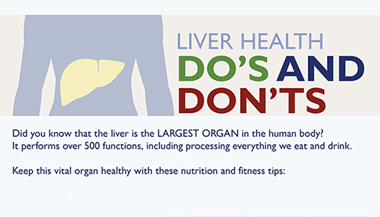Acute Liver Failure
What is acute liver failure?
Acute liver failure is a rare condition. It happens when your liver suddenly starts to not work. This often happens right after an overdose of medicine or poisoning. Chronic liver failure happens over a long stretch of time.
What causes acute liver failure?
Taking too much acetaminophen causes most cases of acute liver failure. Acetaminophen is a painkiller found in many over-the-counter and prescription medicines. Certain diseases can also cause acute liver failure, such as hepatitis and Wilson disease. In some cases, the cause for liver failure is unknown.
Who is at risk for acute liver failure?
You are at risk for acute liver failure if you:
-
Take too much acetaminophen
-
Have certain diseases or infections, such as hepatitis, Wilson disease, and herpes simplex virus
-
Drink a lot of alcohol
-
Have poor blood flow to the liver
What are the symptoms of acute liver failure?
If you have acute liver failure, you may have symptoms such as:
-
Diarrhea
-
Discomfort on your right side, just below your ribs
-
Fatigue
-
Loss of appetite
-
Nausea
As the disease gets worse, you may also become confused and very sleepy. Other symptoms include:
-
Bruising or bleeding easily
-
Jaundice (a yellowing of the skin and whites of the eyes)
-
Vomiting blood
-
Buildup of fluid in your belly (abdomen)
How is acute liver failure diagnosed?
Liver failure is a serious condition. It requires medical care right away. Your healthcare provider will ask about your past health, your use of medicines, illegal drugs, and unregulated natural supplements, and any possible exposure to toxins. You will also need a physical exam. Your healthcare provider may check for signs of hepatitis, such as jaundice, fatigue, and abdominal pain.
You may also need:
-
Tests for mental alertness
-
Blood tests. These check your liver enzymes and bilirubin levels. They also measure your blood's ability to thicken (coagulate). This is called prothrombin time.
-
Imaging tests. You may have a CT scan or MRI. These check your liver.
How is acute liver failure treated?
Treatment for acute liver failure depends on the underlying cause. If your healthcare provider thinks you took too much acetaminophen, you will probably be given activated charcoal. Taking this will help your body lower how much medicine is absorbed in your gastrointestinal tract. Or you may take N-acetylcysteine. This medicine can also help with an acetaminophen overdose. You can take this medicine either by mouth or through your vein. It's also sometimes helpful to people with acute liver failure that was not caused by too much acetaminophen.
If viral hepatitis is the cause of your acute liver failure, your healthcare provider may give you certain medicines depending on the type of hepatitis you have. If you have autoimmune hepatitis, your healthcare provider can treat you with steroids.
If your healthcare provider can’t find the cause of your acute liver failure, you may need a liver biopsy. This test can give more information about your liver. It can also help your healthcare provider decide on treatment.
If treatment can’t get your liver working again, you may need a liver transplant. Good candidates for transplant are strong enough for surgery. They don’t have underlying cardiovascular disease, severe infection, or other diseases, like AIDS. But people with controlled HIV can get a liver transplant. If you are approved for a liver transplant, your name will be put on a waiting list to get a donated organ. People with the most urgent need are placed at the top of the list.
While you are waiting for a liver to become available, you may be able to have some therapies to keep you alive. But how well these treatments may work is unclear.
What are possible complications of acute liver failure?
If you have acute liver failure, common complications are:
-
Bacterial and fungal infections
-
Low blood sugar
-
Swelling of the brain
-
Confusion
-
Abdominal swelling
-
Jaundice
-
Abnormal bleeding
Can acute liver failure be prevented?
You can prevent some of the underlying causes of acute liver failure. Make sure you:
-
Always follow the directions on the label when taking a medicine that has acetaminophen. Be very careful not to mix medicines that contain acetaminophen. Talk with your pharmacist or healthcare provider if you have questions.
-
Stop drinking alcohol if you have a liver problem.
-
Talk with your healthcare provider about the hepatitis A and B vaccines. You may need these if you are at risk for coming into contact with the blood or feces of a person who has viral hepatitis. If you visit other countries, particularly developing nations, don't drink local tap water.
When should I call my healthcare provider?
Acute liver failure can happen in as little as 48 hours. Seek medical care at the first signs of trouble, such as:
-
Fatigue
-
Nausea
-
Diarrhea
-
Discomfort in your right side, just below your ribs
Key points about acute liver failure
-
Acute liver failure happens when your liver suddenly starts to not work.
-
An overdose of acetaminophen is the most common cause of acute liver failure.
-
At first, acute liver failure causes fatigue, nausea, loss of appetite, discomfort on your right side just below your ribs, and diarrhea. As it gets worse, your skin may turn yellow, and you may become confused or comatose.
-
Acute liver failure is a serious condition. It requires medical care right away.
-
If treatments are not effective, you may be a candidate for a liver transplant.




